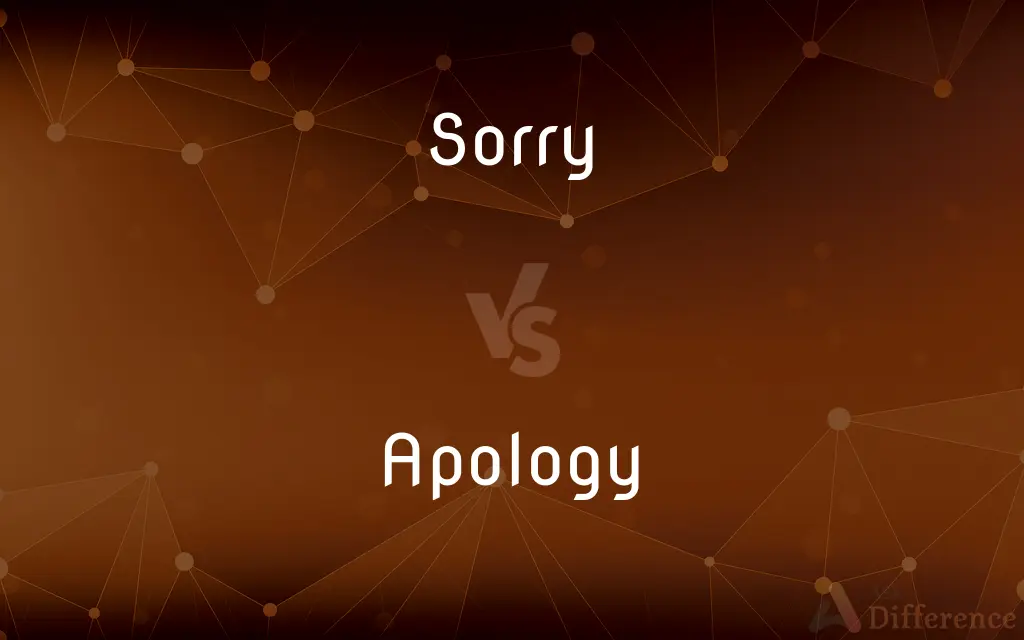Sorry vs. Apology — What's the Difference?
Edited by Tayyaba Rehman — By Maham Liaqat — Updated on March 25, 2024
"Sorry" expresses personal regret, while "apology" involves acknowledging wrongdoing and seeking forgiveness.

Difference Between Sorry and Apology
Table of Contents
ADVERTISEMENT
Key Differences
Saying "sorry" is a way to express personal regret or sorrow for a situation, often used in both casual and serious contexts. It's a term that conveys empathy and understanding, showing that one is affected by the situation or the feelings of another person. On the other hand, an apology is a formal acknowledgment of wrongdoing, accompanied by a clear statement of regret for one's actions and often an explanation. It's a more structured expression that typically involves taking responsibility and seeking forgiveness.
While "sorry" can be used in everyday situations to express sympathy or regret over minor inconveniences or accidents, an apology tends to be reserved for circumstances where there has been a significant impact or harm caused by one's actions. This distinction makes an apology a more deliberate and often more impactful gesture of reconciliation.
In terms of emotional weight, "sorry" can be seen as a more immediate, often reflexive response that doesn't always require an admission of fault. An apology, however, carries a deeper level of remorse and is usually accompanied by an intention to make amends or change behavior to prevent a recurrence of the offending action.
The effectiveness of "sorry" versus an apology can vary based on the context and the relationship between the individuals involved. In close relationships, a simple "sorry" might suffice to express regret and mend feelings, whereas in more formal or severe situations, a full apology is necessary to adequately address the issue and facilitate healing or forgiveness.
Both "sorry" and an apology are crucial in maintaining healthy interpersonal relationships, but they serve different purposes and are used in different contexts. Understanding when to use each can enhance communication and emotional connections between people, promoting empathy, understanding, and conflict resolution.
ADVERTISEMENT
Comparison Chart
Expression
Conveys personal regret or sorrow.
Formal acknowledgment of wrongdoing.
Context
Used in casual and serious contexts.
Reserved for significant impacts or harm.
Emotional Weight
Can be immediate and reflexive.
Carries deeper remorse and responsibility.
Admission of Fault
Not always required.
Involves taking responsibility.
Purpose
Expresses empathy and understanding.
Seeks forgiveness and intends to make amends.
Compare with Definitions
Sorry
Expression used for minor inconveniences.
Sorry, I stepped on your toe.
Apology
Formal acknowledgment of a mistake or wrongdoing.
I owe you an apology for how I acted.
Sorry
Expression of regret or sorrow.
I'm sorry for your loss.
Apology
Seeks forgiveness from the aggrieved party.
I hope you can accept my apology.
Sorry
Can be a polite way to refuse or decline.
Sorry, I can't make it to the party.
Apology
Involves taking responsibility for one's actions.
My apology comes with a promise to change.
Sorry
A way to acknowledge a mistake without a formal apology.
Sorry, I didn't mean to do that.
Apology
Often accompanied by an explanation.
Let me offer an apology and explain why it happened.
Sorry
Used to empathize with someone's situation.
I'm so sorry you're going through this.
Apology
Can be part of a process to make amends.
My apology includes a plan to make things right.
Sorry
Feeling or expressing sorrow
We're sorry to hear that you're leaving so soon.
Apology
An acknowledgment expressing regret or asking pardon for a fault or offense
Please accept my apology for being so late.
Sorry
Feeling or expressing sympathy or pity
She felt sorry for the rain-soaked cat.
Apology
A formal justification or defense.
Sorry
Feeling or expressing regret, especially for a misdeed or mistake
He said he was sorry for breaking the window. I'm sorry I yelled at you.
Apology
An explanation or excuse
"The consequence of those measures will be the best apology for my conduct" (Daniel Defoe).
Sorry
Worthless or inferior; paltry
A sorry excuse.
Apology
An inferior substitute
The sagging cot was a poor apology for a bed.
Sorry
Causing sorrow, grief, or misfortune; grievous
A sorry development.
Apology
An expression of remorse or regret for having said or done something that harmed another: an instance of apologizing (saying that one is sorry).
What he said really hurt my feelings, but his apology sounded so sincere that I couldn't help but forgive him.
The CEO made a public apology for the scandal, and promised full cooperation with the authorities.
Sorry
Used to express apology.
Apology
A formal justification, defence.
The Apology of Socrates.
Sorry
Used to express interrogation, especially as a request for a person to say something again.
Apology
Anything provided as a substitute; a makeshift.
A poor apology for a hotel room
Sorry
(of a person) Regretful or apologetic for one's actions.
I am sorry I stepped on your toes. It was an accident.
Apology
Something said or written in defense or justification of what appears to others wrong, or of what may be liable to disapprobation; justification; as, Tertullian's Apology for Christianity.
It is not my intention to make an apology for my poem; some will think it needs no excuse, and others will receive none.
Sorry
(of a person) Grieved or saddened, especially by the loss of something or someone.
I am sorry for your loss.
The President was sorry to hear that the Ambassador was leaving.
Apology
An acknowledgment intended as an atonement for some improper or injurious remark or act; an admission to another of a wrong or discourtesy done him, accompanied by an expression of regret.
Sorry
Poor, pitifully sad or regrettable.
The storm left his garden in a sorry state.
Apology
Anything provided as a substitute; a makeshift.
He goes to work devising apologies for window curtains.
Sorry
Pathetic; contemptibly inadequate.
Bob is a sorry excuse for a football player.
Apology
To offer an apology.
For which he can not well apology.
Sorry
The act of saying sorry; an apology.
Apology
An expression of regret at having caused trouble for someone;
He wrote a letter of apology to the hostess
Sorry
Grieved for the loss of some good; pained for some evil; feeling regret; - now generally used to express light grief or affliction, but formerly often used to express deeper feeling.
Ye were made sorry after a godly manner.
I am sorry for thee, friend; 't is the duke's pleasure.
She entered, were he lief or sorry.
Apology
A formal written defense of something you believe in strongly
Sorry
Melancholy; dismal; gloomy; mournful.
All full of chirking was this sorry place.
Apology
A poor example;
It was an apology for a meal
A poor excuse for an automobile
Sorry
Poor; mean; worthless; as, a sorry excuse.
Cheeks of sorry grain will serve.
Good fruit will sometimes grow on a sorry tree.
Sorry
Keenly sorry or regretful;
Felt bad about letting the team down
Was sorry that she had treated him so badly
Felt bad about breaking the vase
Sorry
Feeling or expressing sorrow or pity;
A pitying observer threw his coat around her shoulders
Let him perish without a pitying thought of ours wasted upon him
Sorry
Having regret or sorrow or a sense of loss over something done or undone;
Felt regretful over his vanished youth
Regretful over mistakes she had made
Sorry
Feeling or expressing pain or sorrow for sins or offenses
Sorry
Bad; unfortunate;
My finances were in a deplorable state
A lamentable decision
Her clothes were in sad shape
A sorry state of affairs
Sorry
Without merit;
A sorry horse
A sorry excuse
A lazy no-count, good-for-nothing goldbrick
The car was a no-good piece of junk
Common Curiosities
Can an apology be given without saying "sorry"?
Yes, an apology can be structured to express regret and seek forgiveness without specifically using the word "sorry."
Can "sorry" and "apology" be used interchangeably?
While related, they're not fully interchangeable; "sorry" is more about expressing regret, and "apology" is a formal acknowledgment of wrongdoing.
What makes an apology effective?
An effective apology takes responsibility, expresses sincere regret, offers an explanation, and includes a commitment to change or make amends.
Is saying "sorry" enough to make amends?
It depends on the context; for minor issues, "sorry" might suffice, but more serious situations often require a full apology.
Why might someone prefer to say "sorry" instead of offering an apology?
Saying "sorry" can be easier and less formal, suitable for everyday situations or when one doesn't want to fully admit fault.
How can one apologize if they don't feel entirely at fault?
One can acknowledge the other's feelings and express regret for the situation without fully taking blame, focusing on mending the relationship.
Does the severity of the situation always dictate whether to say "sorry" or offer an apology?
Generally, yes; more severe or impactful situations usually warrant a full apology, whereas "sorry" can be used for minor issues.
How does culture affect the use of "sorry" and "apology"?
Cultural norms can influence how and when people express regret or make apologies, with some cultures placing more emphasis on formal apologies.
Can a written apology replace a verbal one?
A written apology can be appropriate and meaningful, especially if it allows for thoughtful expression, but in some cases, a verbal apology may be more personal and impactful.
Is it possible to overuse "sorry"?
Yes, overusing "sorry" can diminish its impact, making it seem less sincere or meaningful.
How do children learn the difference between "sorry" and an apology?
Children learn through guidance from adults, who can explain the differences and model appropriate situations for each.
Can an apology ever be harmful?
If not sincere or used manipulatively, an apology can sometimes exacerbate the situation or come across as insincere.
How does the timing of an apology affect its reception?
The timing is crucial; a prompt apology is often more well-received, showing immediacy in addressing the wrongdoing and expressing regret.
Are there cultural rituals associated with apologies?
Yes, some cultures have specific rituals or formalities for apologies, reflecting the value placed on reconciliation and social harmony.
Can public figures' apologies impact their reputation?
Yes, the way public figures apologize can significantly affect their public image, with sincere apologies often helping to mend their reputation.
Share Your Discovery

Previous Comparison
Sporophyte vs. Gametophyte
Next Comparison
Christianity vs. ProtestantismAuthor Spotlight
Written by
Maham LiaqatEdited by
Tayyaba RehmanTayyaba Rehman is a distinguished writer, currently serving as a primary contributor to askdifference.com. As a researcher in semantics and etymology, Tayyaba's passion for the complexity of languages and their distinctions has found a perfect home on the platform. Tayyaba delves into the intricacies of language, distinguishing between commonly confused words and phrases, thereby providing clarity for readers worldwide.
















































